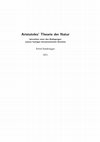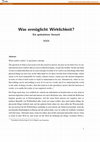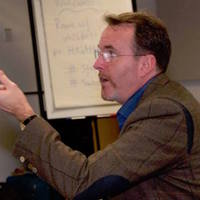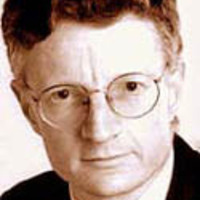Drafts by Erwin Sonderegger
or H. Putnam, 1994, 50, who speaks about what Burnyeat called ''the Christian view'': …if there i... more or H. Putnam, 1994, 50, who speaks about what Burnyeat called ''the Christian view'': …if there is another interpretation that is both textually more sound and philosophically more powerful (…), then where does the rival interpretation come from, and why has it enjoyed such a long history? We find the history of this misreading so interesting that we cannot resist a brief digression.
Is reality the basis of everything or has reality itself an other basis? What makes realitynot th... more Is reality the basis of everything or has reality itself an other basis? What makes realitynot the real things-to be active, to exist? The question of what is real seems to be an easy question, because in our daily lives we are and must be naive realists. We ourselves, the things around us, the world, the facts, all that is real.

Plato’s and Aristotle’s. The themes of both corpora are manyfold and they had all the
time a very... more Plato’s and Aristotle’s. The themes of both corpora are manyfold and they had all the
time a very strong and different reception and impact. Aristotle’s texts were used for
different aims which lead to some convictions that became solid as concrete. Nobody,
or almost nobody doubts that Aristotle has developed a metaphysics with substance at its
core, that the high point and the ‘coping stone’ of this metaphysics is a theology with a
God allegedly called by Aristotle ‘unmoved mover’ (note: an expression Aristotle never
uses). He also is credited with a natural science, the only point of contention is whether
that was for the better or for the worse.
In the 19th and 20th centuries the hermeneutical situation to read Aristotle’s texts
has changed drastically. We have at our disposal editions that are easily available and
more reliable than ever, we know that the texts were not designed at the desk like texts
of modern philosophers, Kant or Husserl, they were preparations of the docent for his
lectures or seminars, we have learned that not every philosophy must build a system,
we have understood the origin of his vocabulary in the ordinary language, the idea of a
philosophia perennis has proven itself to be time-bound, it has become evident that it
were Neo-platonic texts, ascribed to Aristotle, which have plunged his texts in a theological
light.
Such developments allow and force us to to read the texts with new eyes. We must set
aside the presuppositions from the Middle Ages, especially the metaphysics of substance
and its theological consequences, they have no basis in the texts. We can learn from
Aristotle that it is necessary and possible to reflect on the basic beliefs of our time and of
our world, and, how to do that: by speculation in topical attitude. The report of the results
is given in the manner of ‘thinking without contention’ (unbehauptendes Denken). He
gives an example of a world without substance and subject.
Our everyday knowledge and the knowledge of the sciences are based on presuppositions of differen... more Our everyday knowledge and the knowledge of the sciences are based on presuppositions of different fundamentality. The most general framework includes opinions about being, then the way a particular language sorts reality, precepts of logic, what Husserl called the natural attitude. Furthermore, specific content-related prerequisites and convictions are decisive in the individual sciences. Also modern readers of Aristotelian texts share some such specific convictions. I would like to speak of two of them here, since they are evidently false and considerably hindering the understanding of the texts. The first conviction is that Aristotle developed a metaphysics of substance, the second that he thereby founded a theology with an ‘unmoved mover’ as its center, which can be identified with God.

This book deals with globalisation, its foundations, its rise and fall and the question of its fu... more This book deals with globalisation, its foundations, its rise and fall and the question of its future.
It discusses the conditions that have led, each in its own way, to the reduction of the many worlds to one. The first foundations were laid in the time of the discoveries, the earth was recognised and measured as a unified space. Missionary work and colonisation have made the geographical unit into a unity of fundamental beliefs, values and Western European languages. The brisk trade with the colonies also unified the financial and economic situation of the conquered foreign worlds, which were managed according to Western patterns.
The small gain of the political independence of the states achieved in the decolonisation movement was unfortunately destroyed by the great losses already suffered in the area of the fundamental values of the original worlds, their languages, their ways of living, their faith. In the new situation it became apparent that the economic dependence on the former colonial states was increasing rather than decreasing, the way of doing politics had remained by habit that of the colonial powers. Decolonisation was not a way back to the old world.
Two metaphysical assumptions of globalisation are discussed in more detail. One is the assumption of realism that the world is one. This assumption justifies missionary and colonialist action. On the other hand, there is the thesis of liberalism that the being of the beings is its economic value. Against the realistic assumption of the one world, arguments are put forward which justify and make plausible the opposite assumption of a multitude of worlds.
Now that the world is de facto one thanks to globalisation, and now that it is suffering from problems that affect all people, a new kind of globalisation is needed, one that recognises and respects different worlds on the one hand, but is nevertheless capable of tackling environmental, financial and social problems together.
Depending on the subject, two very different ways of reasoning are used. In the preparatory historical part, the arguments are empirical and stick to details; in the part dealing with the justification of the multiplicity of worlds, the argumentation is theoretical, not to say speculative.
Papers by Erwin Sonderegger
Brüche, Torsi, Unvollendetes, Über das Fragmentarische in Leben, Kunst und Wissenschaft
Archiv für Geschichte der Philosophie, 1983
Die Flügel des Däladus ( zu Ovid)

Platon et Aristote ont-ils pratiqué l'histoire de la philosophie?
Most histories of philosophy make us believe, that there is a line of thought from the Greeks on ... more Most histories of philosophy make us believe, that there is a line of thought from the Greeks on until today. This impression should be checked by this article. At first we contrast some pros and cons of the view that philosophy in general has a history. Then we come back to the question, if Plato or / and Aristotle are really the founders of historiography in philosophy. As test-piece we take the passage in the centre of Plato's Sophist, which shows that the references to past thinkers don't have the purpose to inform us historically, but, first, to continue the current dialogue about being, second, to lead us to the aporie about being, which allows a fresh start for this question. A glance at the doxographies of Aristotle shows (we have a look at that of De Anima), that they have the same target in view, namely to reveal the fundamental opinions of being in a respective world. This way the “history of philosophy” becomes an account of succeeding worlds and the related refl...

Aristoteles' Metaphysik Λ: Ein spekulativer Entwurf, Einführung, Übersetzung, Kommentar
It is among the most widespread and the least questioned convictions that in Metaphysics Lambda A... more It is among the most widespread and the least questioned convictions that in Metaphysics Lambda Aristotle presents a theology which has its basis in a metaphysics of substance. The majority of research literature, compendiums and histories of philosophy argues within this frame. A closer look at the facts reveals that this conviction has no basis in the text. Quite the contrary it is based on a reception with theological interests. It arised over centuries, starting from Patristic times and the Middle Ages; it was influenced by Neoplatonic texts as the Liber de Causis or the Theologia Aristotelis, texts for a long time considered as original Aristotelian books. And, if you read not translations but the Greek text, you see that the word 'god' occurs much less than in a theological book should be. In some translations we find more occurences of that word, and especially in French, Italian, English translations some words as le Bien, l'Intelligence etc. are written with capitals to inticate that it is about god. To make it even more clear, we read often the term 'First Mover' or 'Unmoved Mover' as an other name for god, but this expression is never used by Aristotle. So the reader has the impression that Aristotle speaks continuously about god. In the present book you will find arguments which clean up with the outdated concept of substance in the Aristotelian text, a concept which was developed for quite other problems than Aristotle had, namely theolgical ones. And, if there is no substance, there is no corresponding metaphysics of substance and no theology or onto-theology. If substance, metyphysics, theology play no role in Metaphysics Lambda, what else is its content and aim? That is not so difficult to say because Aristotle says it sufficiently clear in his first sentence, περὶ οὐσίας ἡ θεωρία: our inquiry is about being; its aim is to develop the Frage nach dem Sein and to state a speculative answer. The present text in German is a slightly corrected version of the book published 2008 by the Lang Verlag, Bern. In the meantime I am translating it in English correcting many faults of the German edition, that will be the final version which will be finished 2019 as I hope. (Still I am looking for a corrector of my imperfect English. Please contact me if you are interested to help me: erwinso@sunrise.ch)

Is reality the basis of everything or has reality itself an other basis? What makes reality – not... more Is reality the basis of everything or has reality itself an other basis? What makes reality – not the real things – to be active, to exist? The question of what is real seems to be an easy question, because in our daily lives we are and must be naive realists. We ourselves, the things around us, the world, the facts, all that is real. there must be several concepts of reality if we want to say that not only physical or material things of everyday life are real, e. g. numbers, π, Dr. Faustus, thoughts, emotions and other things. On the other hand, given the difference of classical physics and modern physics, we see that even that form of knowledge, which seems to be most responsible for reality, natural science, cannot give the desired uniqueness in terms of what itself wants or needs to understand as real. Alternatively, when we see that nothing can be and nothing can be real without being in a world, and when we understand the world as the order of things, which I call worldI , the...

Globalisierung angesichts der Vielheit von Welten
Globalisation Considering the Multitude of Worlds This book deals with globalisation, its foundat... more Globalisation Considering the Multitude of Worlds This book deals with globalisation, its foundations, its rise and fall and the question of its future. It discusses the conditions that have led, each in its own way, to the reduction of the many worlds to one. The first foundations were laid in the time of the discoveries, the earth was recognised and measured as a unified space. Missionary work and colonisation have made the geographical unit into a unity of fundamental beliefs, values and Western European languages. The brisk trade with the colonies also unified the financial and economic situation of the conquered foreign worlds, which were managed according to Western patterns. The small gain of the political independence of the states achieved in the decolonisation movement was unfortunately destroyed by the great losses already suffered in the area of the fundamental values of the original worlds, their languages, their ways of living, their faith. In the new situation it beca...

Globalisation Considering the Multitude of Worlds This book deals with globalisation, its foundat... more Globalisation Considering the Multitude of Worlds This book deals with globalisation, its foundations, its rise and fall and the question of its future. It discusses the conditions that have led, each in its own way, to the reduction of the many worlds to one. The first foundations were laid in the time of the discoveries, the earth was recognised and measured as a unified space. Missionary work and colonisation have made the geographical unit into a unity of fundamental beliefs, values and Western European languages. The brisk trade with the colonies also unified the financial and economic situation of the conquered foreign worlds, which were managed according to Western patterns. The small gain of the political independence of the states achieved in the decolonisation movement was unfortunately destroyed by the great losses already suffered in the area of the fundamental values of the original worlds, their languages, their ways of living, their faith. In the new situation it became apparent that the economic dependence on the former colonial states was increasing rather than decreasing, the way of doing politics had remained by habit that of the colonial powers. Decolonisation was not a way back to the old world. Two metaphysical assumptions of globalisation are discussed in more detail. One is the assumption of realism that the world is one. This assumption justifies missionary and colonialist action. On the other hand, there is the thesis of liberalism that the being of the beings is its economic value. Against the realistic assumption of the one world, arguments are put forward which justify and make plausible the opposite assumption of a multitude of worlds. Now that the world is de facto one thanks to globalisation, and now that it is suffering from problems that affect all people, a new kind of globalisation is needed, one that recognises and respects different worlds on the one hand, but is nevertheless capable of tackling environmental, financial and social problems together. Depending on the subject, two very different ways of reasoning are used. In the preparatory historical part, the arguments are empirical and stick to details; in the part dealing with the justification of the multiplicity of worlds, the argumentation is theoretical, not to say speculative.

Aristotle, Metaphysics Λ Introduction, Translation, Commentary A Speculative Sketch devoid God
The present text is the revised and corrected English translation of the book published in German... more The present text is the revised and corrected English translation of the book published in German by the Lang Verlag, Bern 2008. Unfortunately the text still has some minor flaws (especially in the Index Locorum) but they do not concern the main thesis or the arguments. It will still be the final version, especially considering my age. It is among the most widespread and the least questioned convictions that in Metaphysics Lambda Aristotle presents a theology which has its basis in a metaphysics of substance. Doubts about theological interpretation are beginning to stir in a growing number of publications, but nevertheless the majority of research literature, compendiums and histories of philosophy argues within this frame. A closer look at the facts reveals that this conviction has no basis in the text. Quite the contrary it is based on a reception with theological interests. It arised over centuries, starting from Patristic times and the Middle Ages; it was influenced by Neoplatonic texts as the Liber de Causis or the Theologia Aristotelis, texts for a long time considered as original Aristotelian books. And, if you read not translations but the Greek text, you see that the word 'god' occurs much less than in a theological book should be. In some translations we find more occurences of that word, and especially in French, Italian, English translations some words as le Bien, l'Intelligence etc. are written with capitals to inticate that it is about god. To make it even more clear, we read often the term 'First Mover' or 'Unmoved Mover' as an other name for god, but this expression is never used by Aristotle. So the reader has the impression that Aristotle speaks continuously about god. In addition, in the present book you will find arguments which clean up with the outdated concept of substance in the Aristotelian text, a concept which was developed for quite other problems than Aristotle had, namely theolgical ones. And, if there is no substance, there is no corresponding metaphysics of substance and no theology or onto-theology. If substance, metyphysics, theology play no role in Metaphysics Lambda, what else is its content and aim? That is not so difficult to say because Aristotle says it sufficiently clear in his first sentence, περὶ οὐσίας ἡ θεωρία: our inquiry is about being; its aim is to develop the Frage nach dem Sein and to state a speculative answer: being is noesis, Sein ist Gewahren.
Die Bildung der Seele in Platons Timaios 35a1-b3
Two dogmas that many readers of Aristotle's Metaphysics share
Our everyday knowledge and the knowledge of the sciences are based on presuppositions of differen... more Our everyday knowledge and the knowledge of the sciences are based on presuppositions of different fundamentality. The most general framework includes opinions about being, then the way a particular language sorts reality, precepts of logic, what Husserl called the natural attitude. Furthermore, specific content-related prerequisites and convictions are decisive in the individual sciences. Also modern readers of Aristotelian texts share some such specific convictions. I would like to speak of two of them here, since they are evidently false and considerably hindering the understanding of the texts. The first conviction is that Aristotle developed a metaphysics of substance, the second that he thereby founded a theology with an ‘unmoved mover’ as its center, which can be identified with God.

Anselms Proslogion : Besinnung statt Beweis
To many readers it seemed that ANSELM in his Proslogion is about to demonstrate the existence of ... more To many readers it seemed that ANSELM in his Proslogion is about to demonstrate the existence of god in whom he beliefs, but many of them think, that the demonstration failed. What, if this was not his aim? Considering the whole text we see that a great part of it is prayer. Praying ANSELM can articulate his opinions and beliefs about god, the greatest being, formulate his worrying questions about him. In the other part of the text he can reflect on all this in order to seek for the fundamentals of being just in his world. For this question it is clear that the categorical examination does not suffice, the modal must follow. The question, if god exists or not, is foreground only, the underlying question is what makes being complete. On the basis of the discussion about god the question about being is possible. ANSELM asks this question in the form of meditation and therefore he never had in mind to proof whatsoever.
Aristotle’s Theory of Nature from the Point of View of Our Hermeneutical Situation
Aristotle on Logic and Nature, 2019
Simplikios: Über die Zeit
Simplikios: Über die Zeit, 1982











Uploads
Drafts by Erwin Sonderegger
time a very strong and different reception and impact. Aristotle’s texts were used for
different aims which lead to some convictions that became solid as concrete. Nobody,
or almost nobody doubts that Aristotle has developed a metaphysics with substance at its
core, that the high point and the ‘coping stone’ of this metaphysics is a theology with a
God allegedly called by Aristotle ‘unmoved mover’ (note: an expression Aristotle never
uses). He also is credited with a natural science, the only point of contention is whether
that was for the better or for the worse.
In the 19th and 20th centuries the hermeneutical situation to read Aristotle’s texts
has changed drastically. We have at our disposal editions that are easily available and
more reliable than ever, we know that the texts were not designed at the desk like texts
of modern philosophers, Kant or Husserl, they were preparations of the docent for his
lectures or seminars, we have learned that not every philosophy must build a system,
we have understood the origin of his vocabulary in the ordinary language, the idea of a
philosophia perennis has proven itself to be time-bound, it has become evident that it
were Neo-platonic texts, ascribed to Aristotle, which have plunged his texts in a theological
light.
Such developments allow and force us to to read the texts with new eyes. We must set
aside the presuppositions from the Middle Ages, especially the metaphysics of substance
and its theological consequences, they have no basis in the texts. We can learn from
Aristotle that it is necessary and possible to reflect on the basic beliefs of our time and of
our world, and, how to do that: by speculation in topical attitude. The report of the results
is given in the manner of ‘thinking without contention’ (unbehauptendes Denken). He
gives an example of a world without substance and subject.
It discusses the conditions that have led, each in its own way, to the reduction of the many worlds to one. The first foundations were laid in the time of the discoveries, the earth was recognised and measured as a unified space. Missionary work and colonisation have made the geographical unit into a unity of fundamental beliefs, values and Western European languages. The brisk trade with the colonies also unified the financial and economic situation of the conquered foreign worlds, which were managed according to Western patterns.
The small gain of the political independence of the states achieved in the decolonisation movement was unfortunately destroyed by the great losses already suffered in the area of the fundamental values of the original worlds, their languages, their ways of living, their faith. In the new situation it became apparent that the economic dependence on the former colonial states was increasing rather than decreasing, the way of doing politics had remained by habit that of the colonial powers. Decolonisation was not a way back to the old world.
Two metaphysical assumptions of globalisation are discussed in more detail. One is the assumption of realism that the world is one. This assumption justifies missionary and colonialist action. On the other hand, there is the thesis of liberalism that the being of the beings is its economic value. Against the realistic assumption of the one world, arguments are put forward which justify and make plausible the opposite assumption of a multitude of worlds.
Now that the world is de facto one thanks to globalisation, and now that it is suffering from problems that affect all people, a new kind of globalisation is needed, one that recognises and respects different worlds on the one hand, but is nevertheless capable of tackling environmental, financial and social problems together.
Depending on the subject, two very different ways of reasoning are used. In the preparatory historical part, the arguments are empirical and stick to details; in the part dealing with the justification of the multiplicity of worlds, the argumentation is theoretical, not to say speculative.
Papers by Erwin Sonderegger
time a very strong and different reception and impact. Aristotle’s texts were used for
different aims which lead to some convictions that became solid as concrete. Nobody,
or almost nobody doubts that Aristotle has developed a metaphysics with substance at its
core, that the high point and the ‘coping stone’ of this metaphysics is a theology with a
God allegedly called by Aristotle ‘unmoved mover’ (note: an expression Aristotle never
uses). He also is credited with a natural science, the only point of contention is whether
that was for the better or for the worse.
In the 19th and 20th centuries the hermeneutical situation to read Aristotle’s texts
has changed drastically. We have at our disposal editions that are easily available and
more reliable than ever, we know that the texts were not designed at the desk like texts
of modern philosophers, Kant or Husserl, they were preparations of the docent for his
lectures or seminars, we have learned that not every philosophy must build a system,
we have understood the origin of his vocabulary in the ordinary language, the idea of a
philosophia perennis has proven itself to be time-bound, it has become evident that it
were Neo-platonic texts, ascribed to Aristotle, which have plunged his texts in a theological
light.
Such developments allow and force us to to read the texts with new eyes. We must set
aside the presuppositions from the Middle Ages, especially the metaphysics of substance
and its theological consequences, they have no basis in the texts. We can learn from
Aristotle that it is necessary and possible to reflect on the basic beliefs of our time and of
our world, and, how to do that: by speculation in topical attitude. The report of the results
is given in the manner of ‘thinking without contention’ (unbehauptendes Denken). He
gives an example of a world without substance and subject.
It discusses the conditions that have led, each in its own way, to the reduction of the many worlds to one. The first foundations were laid in the time of the discoveries, the earth was recognised and measured as a unified space. Missionary work and colonisation have made the geographical unit into a unity of fundamental beliefs, values and Western European languages. The brisk trade with the colonies also unified the financial and economic situation of the conquered foreign worlds, which were managed according to Western patterns.
The small gain of the political independence of the states achieved in the decolonisation movement was unfortunately destroyed by the great losses already suffered in the area of the fundamental values of the original worlds, their languages, their ways of living, their faith. In the new situation it became apparent that the economic dependence on the former colonial states was increasing rather than decreasing, the way of doing politics had remained by habit that of the colonial powers. Decolonisation was not a way back to the old world.
Two metaphysical assumptions of globalisation are discussed in more detail. One is the assumption of realism that the world is one. This assumption justifies missionary and colonialist action. On the other hand, there is the thesis of liberalism that the being of the beings is its economic value. Against the realistic assumption of the one world, arguments are put forward which justify and make plausible the opposite assumption of a multitude of worlds.
Now that the world is de facto one thanks to globalisation, and now that it is suffering from problems that affect all people, a new kind of globalisation is needed, one that recognises and respects different worlds on the one hand, but is nevertheless capable of tackling environmental, financial and social problems together.
Depending on the subject, two very different ways of reasoning are used. In the preparatory historical part, the arguments are empirical and stick to details; in the part dealing with the justification of the multiplicity of worlds, the argumentation is theoretical, not to say speculative.